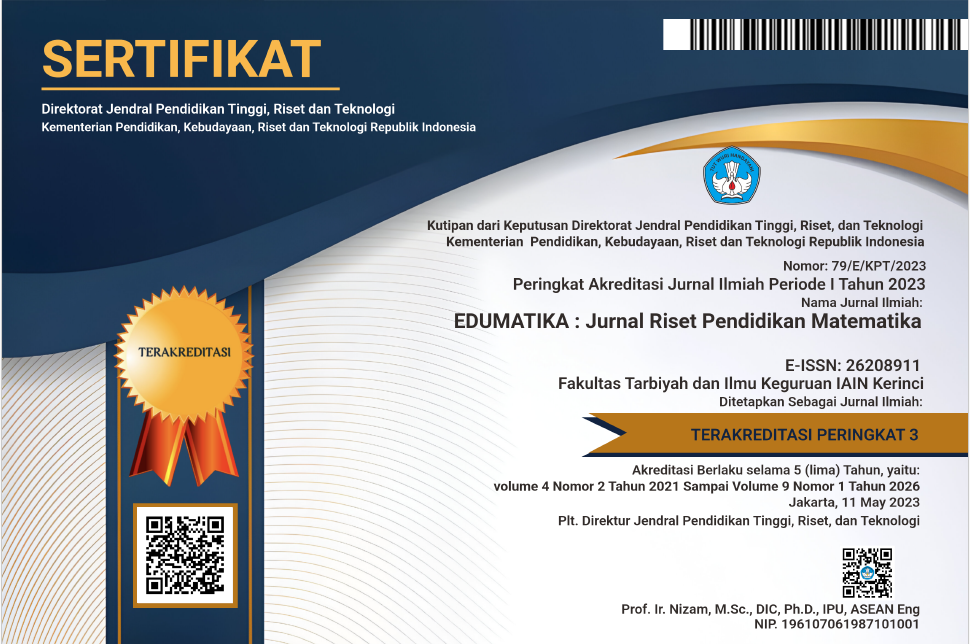The Student Achievement assisted Edmodo: An Alternative to Online Learning in the Pandemic Era
Abstract
Due to the Covid-19 pandemic, face-to-face instruction in the field of education has been replaced by online learning. As a result, to meet the learning goals, teachers must be innovative and creative while delivering online learning. Student Achievement with Edmodo is one alternate online learning choice. This analysis aims to explain the effects of the introduction of Edmodo-supported Student Achievement, as well as student reactions to this learning, and to provide a single learning method that is successful and can aid teaching and learning experiences for high school mathematics content during the Covid-19 pandemic. This study employs qualitative analysis approaches. The subjects of this research were five students from Tasikmalaya City's State Senior High School. Based on the outcomes of a few experiments, it was determined that the learning experience was enjoyable and aided students' comprehension of the Trigonometry content. Students are pleased with the learning experience provided, and they believe they have made improvements as a result of their participation in the learning. According to the effects of the impact size estimation, the implementation of the Student Achievement learning model is very accurate. Then, for general student assessment, Student Achievement learning with Edmodo is beneficial to introduce in the middle of the Covid-19 pandemic, so that it can be used as a substitute in online learning.
Downloads
References
Alijanian, E. (2012). The Effect of Student Teams Achievement Division Technique on English Achievement of Iranian EFL Learners. Theory & Practice in Language Studies, 2(9). https://doi.org/10.4304/tpls.2.9.1971-1975
Arikunto, S. (2012). Prosedur Penelitian : Suatu Pendekatan Praktik (Edisi Revisi). Rineka Cipta.
Becker, L. A. (2000). Effect size ( ES ) - Part I. 1993, 14. http://web.uccs.edu/lbecker/Psy590/es.htm
Blackett, N., & Tall, D. O. (1991). Gender and the versatile learning of trigonometry using computer software. In Proceedings of the 15th Conference of the International Group for the Psychology of Mathematics Education (Vol. 1, pp. 144-151). Assisi: PME.
Borovcnik, M., & Kapadia, R. (2009). Research and developments in probability education. International Electronic Journal of Mathematics Education, 4(3), 111-130.
Chigonga, B. (2016). Learners’ errors when solving trigonometric equations and suggested interventions from grade 12 mathematics teachers. International Society for Technology in Education.
Ellis, R. K. (2010). A Field Guide to Learning management systems. In International anesthesiology clinics.
Irfan, M., Kusumaningrum, B., Yulia, Y., & Widodo, S. A. (2020). Challenges During the Pandemic: Use of E-Learning in Mathematics Learning in Higher Education. Infinity Journal, 9(2), 147–158. http://www.e-journal.stkipsiliwangi.ac.id/index.php/infinity/article/view/1830
Kongchan, C. (2008). How a non-digital-native teacher makes use of Edmodo. In 5th International Conference ICT for Language Learning. Florence.
Manfred, B., & Ramesh, K. (2009). Research and developments in probability education. International Electronic Journal of Mathematics Education.
Omodara, O. D., & Adu, E. I. (2014). Relevance of Educational Media and Multimedia Technology for Effective Service Delivery in Teaching and Learning Processes. IOSR Journal of Research & Method in Education (IOSRJRME).
Pratama, R. A., & Ismiyati, N. (2019). Pembelajaran Matematika Berbasis Edmodo Pada Mata Kuliah Teori Bilangan. AKSIOMA: Jurnal Program Studi Pendidikan Matematika. 8(2), 298-309.
Putra, R., Fauzan, A., & Habibi, M. (2020). The Impact of Cognitive Conflict Based Learning Tools on Students` Mathematical Problem Solving Ability. International Journal of Educational Dynamics, 2(1), 209-218. https://doi.org/10.24036/ijeds.v2i1.247
Rusdin, M. E., Widodo, W., & Maruto, G. (2020). Implementation Cooperative Learning Type STAD Assisted Edmodo in Improving Students’ Critical Thinking Skills. Indonesian Review of Physics, 3(1), 30-34.https://doi.org/10.12928/irip.v3i1.1766
Setiawan, A. R. (2020). Lembar Kegiatan Literasi Saintifik untuk Pembelajaran Jarak Jauh Topik Penyakit Coronavirus 2019 (COVID-19). Edukatif : Jurnal Ilmu Pendidikan, 2(1), 28–37. https://doi.org/10.31004/edukatif.v2i1.80
Setiyani, S., Putri, D. P., & Prakarsa, D. (2019). Designing Camtasia Software Assisted Learning Media Toward Students’ Mathematical Comprehension In Numeral Material. Infinity Journal, 8(2), 143-156. https://doi.org/10.22460/infinity.v8i2.p143-156
Silitonga, L. M., & Wu, T. T. (2019, December). Increasing students’ interest and learning achievement using cooperative learning (Students Team Achievement Division) through Edmodo. In International Conference on Innovative Technologies and Learning (pp. 3-13). Springer, Cham. https://doi.org/10.1007/978-3-030-35343-8_1
Slamet, S., & Maarif, S. (2014). Pengaruh bentuk tes formatif assosiasi pilihan ganda dengan reward dan punishment score pada pembelajaran matematika siswa SMA. Infinity Journal, 3(1), 59-80. https://doi.org/10.22460/infinity.v3i1.39
Slavin, R. E. (2005). Cooperative Learning: Teori, Riset dan Praktik (Cooperative Learning: Theory, Research and Practice). Diterjemahkan oleh Narulita Yusron. Bandung: Nusa Media.
Slavin, R. E. (2015). Instruction Based on Cooperative Learning. In Handbook of Research on Learning and Instruction. https://doi.org/10.4324/9780203839089.ch17
Sohibun, S., & Ade, F. Y. (2017). Pengembangan Media Pembelajaran Berbasis Virtual Class Berbantuan Google Drive. Tadris: Jurnal Keguruan Dan Ilmu Tarbiyah, 2(2), 121. https://doi.org/10.24042/tadris.v2i2.2177
Syawaluddin, A., Rachman, S. A., & Khaerunnisa. (2020). Developing Snake Ladder Game Learning Media to Increase Students’ Interest and Learning Outcomes on Social Studies in Elementary School. Simulation & Gaming, 51(4), 432-442. https://doi.org/10.1177/1046878120921902
Syawaluddin, A., Gunarhadi, & Rintayati, P. (2019). Development of augmented reality-based interactive multimedia to improve critical thinking skills in science learning. International Journal of Instruction, 12(4), 331-344. https://doi.org/10.29333/iji.2019.12421a
Trust, T. (2015). Deconstructing an Online Community of Practice: Teachers’ Actions in the Edmodo Math Subject Community. Journal of Digital Learning in Teacher Education, 31(2), 73-81. https://doi.org/10.1080/21532974.2015.1011293
Trust, T. (2017). Motivation, Empowerment, and Innovation: Teachers’ Beliefs About How Participating in the Edmodo Math Subject Community Shapes Teaching and Learning. Journal of Research on Technology in Education, 49(1-2), 16-30. https://doi.org/10.1080/15391523.2017.1291317
Wijayanti, R., Hasan, B., & Loganathan, R. K. (2018). Media comic math berbasis whiteboard annimation dalam pelajaran matematika. Jurnal Riset Pendidikan Matematika, 5(1), 53-63. https://doi.org/10.21831/jrpm.v5i1.19207
Wrahatnolo, T., Wibawa, S. C., & Wahono, A. (2019). The implementation of Edmodo using cooperative learning model in Operating System. Advan. Soc. Sci. Edu. and Hum. Res., 299, 396-399. https://doi.org/10.2991/ictvet-18.2019.90
Copyright (c) 2021 author(s) and is published under license from the author(s)

This work is licensed under a Creative Commons Attribution 4.0 International License.















